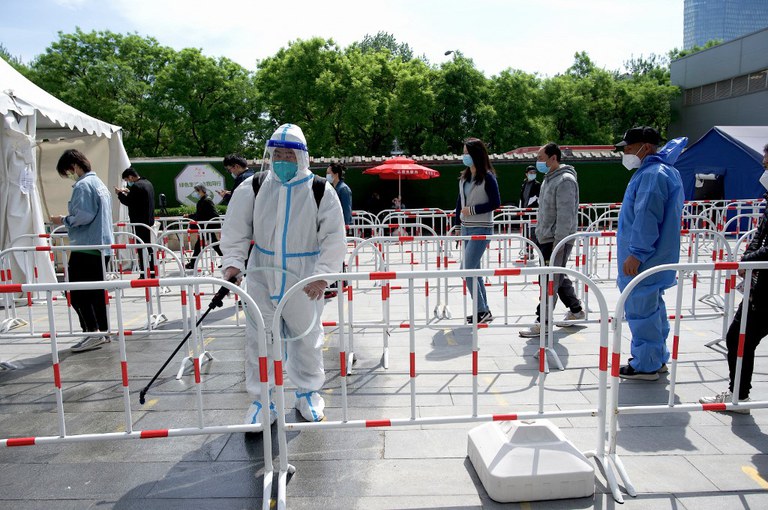North Korean labor managers in China demand more money as job market tightens
North Korean job placement officials in China are demanding more money and perks like free cell phones from Chinese companies for the use of North Korean workers, a consequence of the tight labor market that has grown out of the COVID-19 pandemic, sources in China told RFA. Pyongyang dispatches legions of workers to both Russia and China to work in factories and on construction sites to earn foreign cash for the state. The workers give the lion’s share of their salaries to their North Korean handlers, who forward it to the central government. But demand for workers is rising as China’s economy struggles under a new wave of lockdowns, giving officials at the North Korean human resources companies new negotiating leverage with their Chinese business partners. While the North Koreans say the extra cash will improve the lives of the foreign workers they supervise, Chinese business owners suspect the placement officials are using the money for other purposes. A common tactic is to request more money to improve the workers’ squalid living conditions, a Chinese citizen of Korean descent, from Yanji, in the northeastern province of Jilin, told RFA’s Korean Service on condition of anonymity to speak freely. “On the outskirts of Yanji, about 300 North Korean workers … are employed by a clothing processing company. According to the original contract, the monthly salary per worker is 2,000 yuan (U.S. $297), but the North Korean handler is asking for more money in addition to that,” the source said. “The North Korean handlers demand things like electronic devices like cell phones and laptops, which they will use. Even if the company president buys them the devices, they will still ask for more money under the pretext of feeding the workers meat and providing them with snacks,” he said. Since the border with North Korea remains closed, the labor managers hold all the cards and the company owners have very little leverage, according to the source. “It is impossible to dispatch more manpower from North Korea because of the coronavirus crisis. It’s like the North Korean manpower managers are strangling the Chinese company owner, who is in a hurry to get the factory operating,” he said. “Even with the Chinese company’s proposal to give an average of an additional 30 yuan ($4.46) per worker per day to account for the additional working hours, the North Korean officials argue that it is not enough,” the source said. In some disputes, the North Korean consulate has had to step in to mediate between the labor managers and business owners, another Chinese citizen of Korean descent in the border city of Dandong, which lies across the Yalu River from North Korea’s Sinuiju, told RFA on condition of anonymity for security reasons. “The consulate sent a warning to a North Korean human resource company in a contract with a poultry processing company, urging them to ‘abide by the law and order of the host county,’ but to no avail,” the second source said. “The Chinese company offered an additional 15 yuan [$2.23] per hour per person for night work, but the North Korean official said that was not enough and they got into a huge argument,” he said. The Chinese business owner argued that he would be unable to offer more than the agreed 2,000 yuan per worker per month as stipulated in the contract unless there was additional night work, the second source said. “However, the North Korean officials are raising the issue, saying that fresh vegetables that were brought in daily before the coronavirus crisis have decreased to once a week during the pandemic, and the workers are suffering,” he said. “The officials say that the reason they are arguing over wages is to feed the workers better, but in reality, it is because they don’t have enough funds after they pay off the state,” the second source said, adding that most of the human resource companies operate a cafeteria exclusively for their workers, and they are usually adequately fed. “It is true however that after paying off the government and the consulate, as well as their food and living expenses, they don’t have enough to pay the workers their cut, as well as their food and living expenses,” he said. The U.N. Security Council reported that 50,000 out of 100,000 North Korean overseas workers were dispatched to China. The Chinese government claims to have repatriated more than half of the workers, but did not disclose specific figures. According to RFA sources, about 30,000 North Korean workers are believed to be in the Dandong area. North Korean labor exports were supposed to have stopped when United Nations nuclear sanctions froze the issuance of work visas and mandated the repatriation of North Korean nationals working abroad by the end of 2019. But Pyongyang sometimes dispatches workers to China and Russia on short-term student or visitor visas to get around sanctions. Translated by Leejin J. Chung. Written in English by Eugene Whong.




